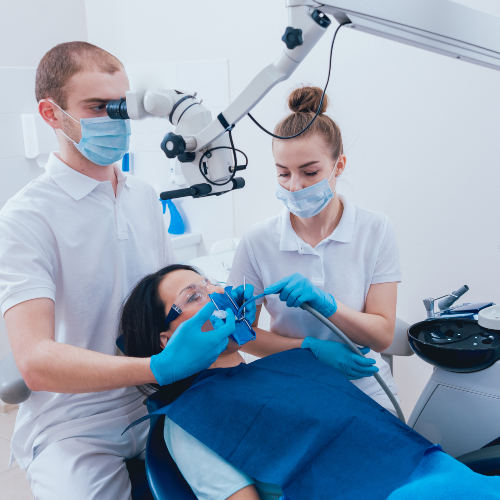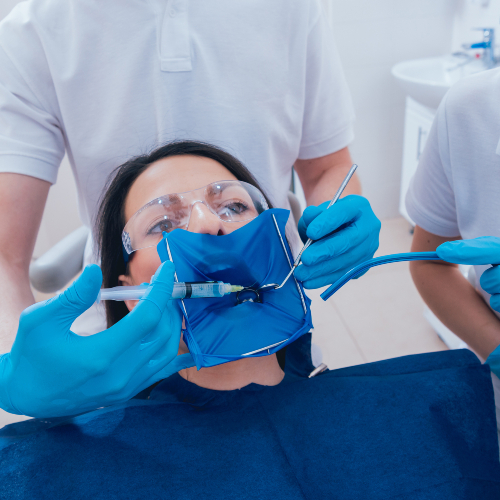


A root canal is a cavity in the root of a tooth that is filled with pulp.
In most circumstances, uncomplicated root canals can be completed in one appointment that lasts between 30 minutes and an hour. In more severe cases, a 90-minute session or even a second appointment may be required if your dentist or endodontist suggests a permanent filling or crown for your tooth. A second appointment would be necessary to ensure that the tooth is fully cleaned, sealed, and safeguarded from additional harm.

In the United States, the typical cost of a root canal is between $700 and $1,500. It depends on where your tooth is located; for example, a front tooth costs between $600 and $900, a bicuspid tooth costs between $700 and $1,000, and a molar tooth costs between $1,000 and $1,400.
A root canal surgery may sound frightening, but with today's technology, it's usually no more difficult than getting a deep filling. Because your dentist will use local anesthesia to numb your tooth and gums so you are comfortable during the procedure, there will be little to no pain. Root canal therapy is painless and can save a tooth that would otherwise have to be extracted.
A root canal is a treatment, the cause for the need for the treatment is a badly decayed or infected tooth. The affected tooth is repaired and saved through a root canal. Deep decay, frequent dental work or big fillings, or a crack or chip in the tooth can cause the nerve and pulp to become irritated, inflamed, and infected.

After a root canal, you can eat after 30 to 45 minutes, which is ample time for your temporary filling to firm completely. However, following a root canal, it's preferable to eat soft foods that don't need much chewing. Eggs, salmon, applesauce, and yogurt are examples of soft foods.
Avoiding hard and hot meals that can harm your teeth at this time is the best thing you can do for them. Because your gums and occasionally your tongue remain numb following a root canal, it's vital not to eat right afterward.
It's best not to eat for a few hours until the numbness in your mouth goes away so you don't bite your cheeks or tongue. Antibiotics aren't required following a root canal. It takes a while for your tooth to recover after root canal therapy. After treatment, it's critical to safeguard your teeth from further harm.
A few foods to stay away from after a root canal:
• Foods and beverages that are too hot or cold
• Gum, caramels, and other sticky candies
• Steak and crusty bread are both chewy foods to keep away.
• Nuts are a hard food.
• Pretzels and tortilla chips are crunchy meals to stay away from.
The following are some symptoms that you could need root canal therapy: When biting or exerting pressure to the area, acute toothache pain occurs. Constant sensitivity to hot or cold temperatures (pain) (after the heat or cold has been removed) The tooth becomes discolored (darkens).
A tooth that requires a root canal is unable to heal on its own. You must seek immediate treatment for a tooth that has been compromised by tooth decay; otherwise, the problem will spread to the tooth's roots, causing severe pain.
Because the tooth was extensively injured before treatment, it would be significantly weaker than your healthy teeth, allowing it to endure for roughly 10 to 15 years, but if it is crowned, its life span can be extended even further. There are, however, techniques to ensure that your tooth lasts the remainder of your life. You can have it crowned, which will give the tooth more strength and endurance.

Because your mouth will be numb for the first few hours after the root canal treatment, you should avoid eating or drinking anything hot until the local anesthesia has worn off completely. You should also avoid smoking at this time and while you are recovering because it will slow down your recovery.
After a root canal, dentists advise against smoking. This is because smoking after a root canal can raise the risk of problems. According to the American Association of Endodontists, smokers are twice as likely as non-smokers to require root canal therapy.
It is preferable to keep a tooth. A tooth can be saved with proper root canal therapy, and with proper dental maintenance, it should last a lifetime without the need for further treatment. Your jawline will remain solid, your teeth will be healthy, and you will require fewer dental appointments if you keep the original tooth.